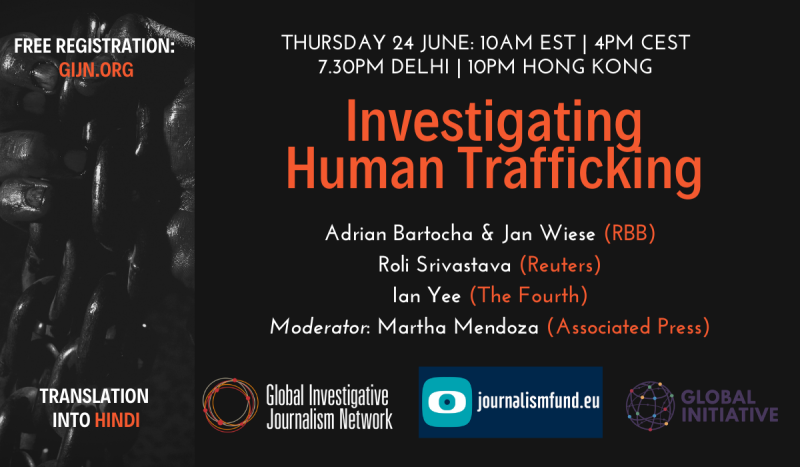This webinar provided tips on how to dig into human trafficking, sex exploitation and labour abuse, and discussed the best ways to cooperate with civil society groups that offer protection to victims of trafficking and slavery.
Slavery and trafficking in human beings, once thought to be vestiges of a brutal past, are not only alive today but have morphed into billion dollar, multinational industries. On any given day, there are an estimated 40 million victims of these crimes, mostly women but also men and children, according to the United Nations. Human trafficking is also one of the fastest-growing activities of transnational crime organizations, and is marked by coercion, exploitation, and violence. It is a critical area for journalists to dig into, but investigation requires perseverance, skill and sensitivity.
To bring journalists the latest tools and techniques, we were pleased to present Investigating Human Trafficking, a 75-minute webinar. This session provided tips on how to dig into the two main types of human trafficking, sex exploitation and labour abuse, and discussed the best ways to cooperate with civil society groups that offer protection to victims of trafficking and slavery.
The webinar was produced by the Global Investigative Journalism Network (GIJN) in partnership with Journalismfund’s Modern Slavery Unveiled programme and the Global Initiative Against Transnational Organized Crime.
Investigating Human Trafficking featured five journalists with experience investigating this topic:
- Roli Srivastava is a correspondent in India with the Thomson Reuters Foundation. She has done extensive reporting on migration and human trafficking in her country, both for Reuters and outlets like The Hindu and The Times of India.
- Jan Wiese and Adrian Bartocha are two senior investigative journalists working for RBB (Rundfunk Berlin-Brandenburg) and Lost in Europe, a cross-border journalism project investigating the disappearance of child migrants in Europe. They made the award-winning documentary “Children as Commodities: The Human Trafficking Mafia,” on the smuggling of young Vietnamese into Western Europe.
- Ian Yee is a journalist, documentary producer and co-founder of The Fourth, an investigative and impact media social enterprise. He recently also became director of the Environmental Reporting Collective, a collaborative investigative team working on environmental issues.
- The moderator is Martha Mendoza, two-time Pulitzer Prize-winning journalist and part of the Associated Press team that exposed the use of slave labour in the Thai seafood industry. She is also author of a chapter on human trafficking that is part of a forthcoming GIJN guide, Investigating Organized Crime.
We gratefully acknowledge the participation of the partners in this production:
- GIJN, the well-known international association of nonprofit organisations that support, promote, and produce investigative journalism;
- the Global Initiative Against Transnational Organized Crime, a Geneva-based civil-society organization seeking new and innovative strategies and responses to organised crime.
The webinar was in English, with Hindi translation available.
Date: Thursday 24 June 2021
Time:
10:00 AM (Washington, DC, Toronto)
15:00 (London, Tunis)
16:00 (Berlin, Cairo, Paris, Johannesburg)
17:00 (Amman, Moscow, Kampala, Nairobi, Istanbul)
19:00 (Islamabad)
19:30 (Delhi)
20:00 (Dhaka)
21:00 (Bangkok, Jakarta, Hanoi)
22:00 (Hong Kong, Kuala Lumpur, Manila)
23:00 (Tokyo, Seoul)
00:00 (Sydney)

